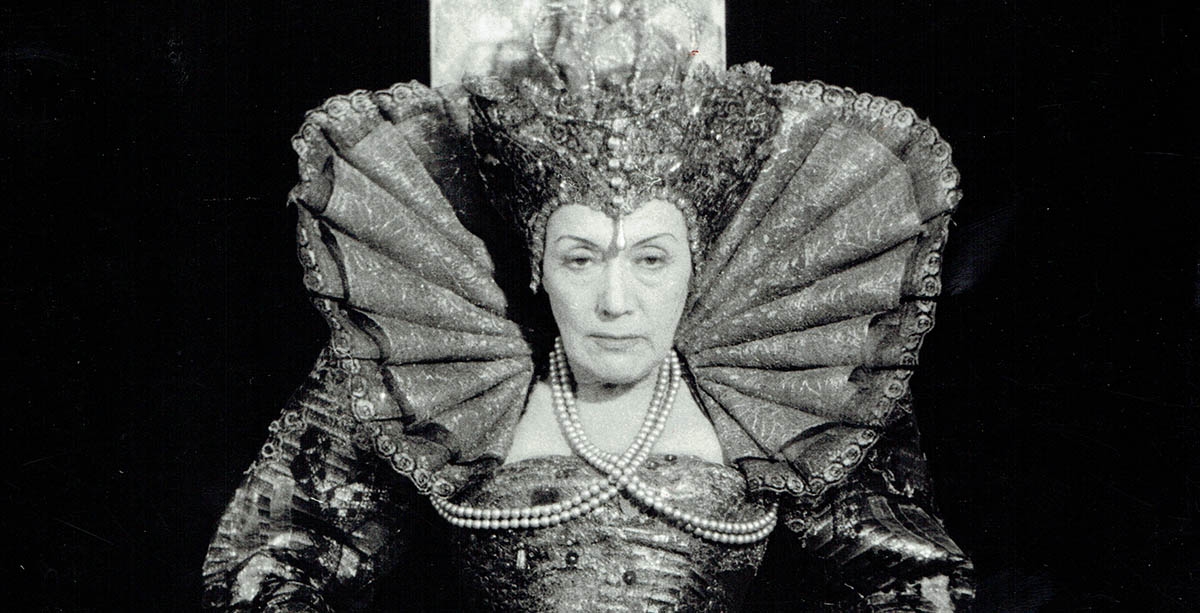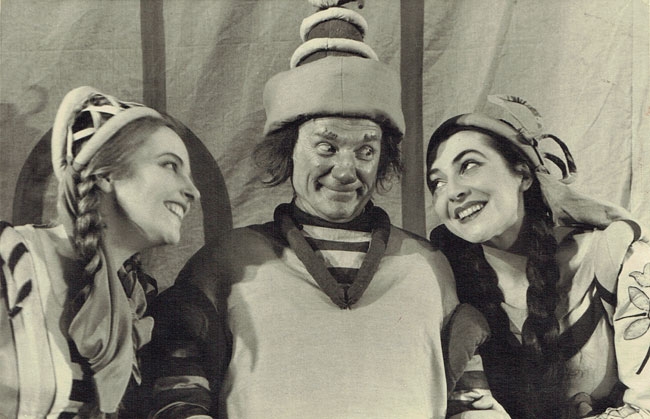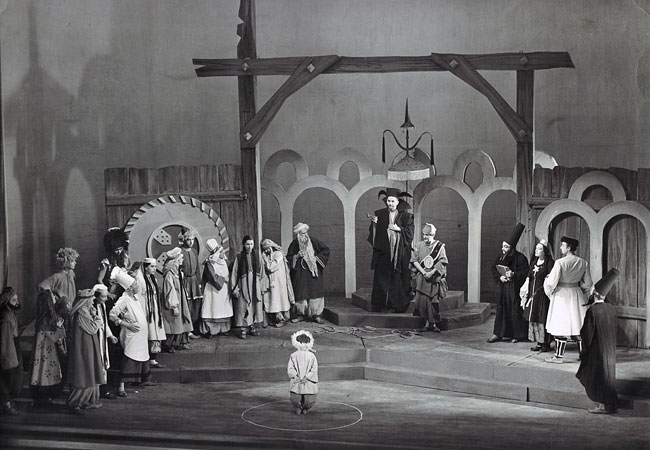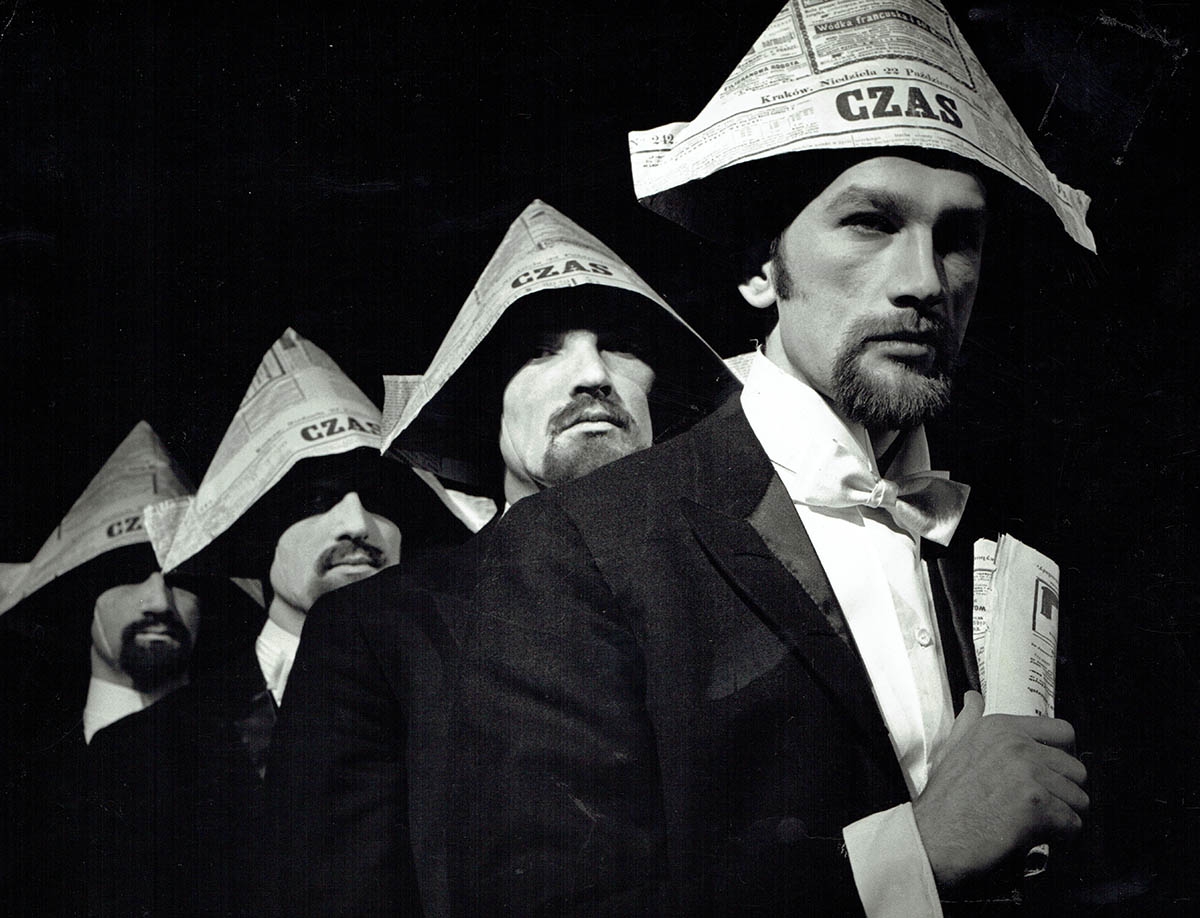Theatre after the War
The Theatre reopened its doors on 19 February 1945. Its first seasons retained its pre-war repertoire – Director Frycz returned with most of the company, and staged traditional, mainly Polish repertoire. However, changes resulting from the new political situation were inevitable. Frycz – accused of conservatism – was dismissed.

Bruckner's Elisabeth of England, 1963. Directed by Irena Babel, scenography and costumes by Krzysztof Pankiewicz. Zofia Jaroszewska as Queen Elisabeth
In 1946, the Słowacki Theatre merged with the Stary Theatre for a few years, making it easier for the authorities to supervise both institutions. In 1947, Bronisław Dąbrowski was appointed the director. He was the longest serving director of the institution in the Holy Spirit Square, and remained in office – with an exception of a few years – until 1972. In the 1940s, the Theatre boasted one of the best companies in Poland.
 de Vega's The Sheep's Well, 1948. Directed by Bronisław Dąbrowski, scenography and costumes by Andrzej Pronaszko. Photo: F. Nowicki
de Vega's The Sheep's Well, 1948. Directed by Bronisław Dąbrowski, scenography and costumes by Andrzej Pronaszko. Photo: F. Nowicki
Alongside the masters – Zofia Jaroszewska, Jan Kurnakowicz, Jerzy Leszczyński, Antoni Fertner, Eugeniusz Fulde, Ludwik Solski – a generation of outstanding young actors began their careers, including Halina Gryglaszewska, Halina Mikołajska, Marta Stebnicka, Marian Cebulski, Adam Hanuszkiewicz, Gustaw Holoubek, Tadeusz Łomnicki. Their generational debut was a real phenomemon in the history of Polish theatre. Dąbrowski’s first, three-year-long, directorship resulted in well-deserved success for the theatre. The audience enjoyed the plays which he directed with a great deal of flair, such as Shakespeare’s Twelfth Night and Midsummer Night’s Dream, L. De Vega’s The Sheep’s Well. The repertoire also offered plays of a more atmospheric and intimate nature, e.g. Three Sisters by Chekhov.
 Brecht's The Caucasian Chalk Circle, 1954. Directed by Irena Babel, scenography by Andrzej Stopka. Photo: F. Węglowski
Brecht's The Caucasian Chalk Circle, 1954. Directed by Irena Babel, scenography by Andrzej Stopka. Photo: F. Węglowski
The Theatre survived the Stalinist period in a fairly good state, and almost manged to steer clear of the then universally mandatory Socialist Realism. Several brilliant performances were produced, and some of their stage design elements were designed by Tadeusz Kantor. After the political events of October 1956, Wyspiański's Liberation was staged here for the first time in post-war Poland. In the 1960s, although the dynamics of artistic events somewhat decreased, there were still numerous valuable phenomena. Apart from Dąbrowski, the directors included Władysław Krzemiński, Bohdan Korzeniewski, Wilam Horzyca, Kazimierz Dejmek, Jerzy Goliński. Scenography remained at an exceptionally high level, thanks to Tadeusz Brzozowski, Wojciech Krakowski, Lidia and Jerzy Skarżyński, and one of the most prominent European scenographers – Andrzej Kreutz-Majewski, who made his debut at the J. Słowacki Theatre. The award-winning performances such as A. Ostrowski's Forest, T. Breza's Office, R. Hochhuth's The Deputy, as well as daring productions of Polish classics, including Mickiewicz's Forefathers' Eve, and world premieres of dramas A View from the Bridge by A. Miller and The Homecoming by H. Pinter are still remembered to this day. Other distinctive phenomena included excellent plays boldly directed by Lidia Zamkow e.g. Shakespeare's Macbeth, F. Dürrenmatt's The Visit of the Old Lady, Sophocles' Oedipus Rex, and Wyspiański's Wedding.

In the 1970s, the Theatre was directed by Krystyna Skuszanka. In 1976, a small stage called Miniatura was opened in the building of the former power-house, and it was there that many directors made their debuts, including Krystian Lupa, Jacek Bunsch and Marcel Kochańczyk. Several productions caused quite a stir, such as the plays with tangible journalistic undertones, e.g. S. Przybyszewska's The Danton's Case and Ninety-Three directed by Jerzy Krasowski, and those harbouring an ambition of reinterpreting the national repertoire, including Słowacki's Lilla Weneda and Wyspiański's Acropolis directed by Skuszanka. One of the theatre's bolder decisions was to stage The Wedding by W. Gombrowicz. Following the election of Polish John Paul II as the Pope, the Krakow stage held the premiere of Karol Wojtyła's Our God's Brother, attracting entire 'pilgrimages' of viewers.
Text: Diana Poskuta-Włodek


